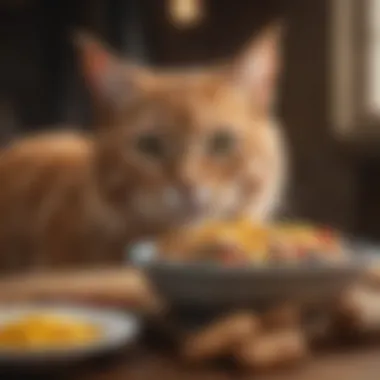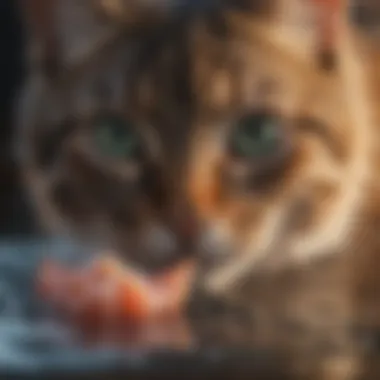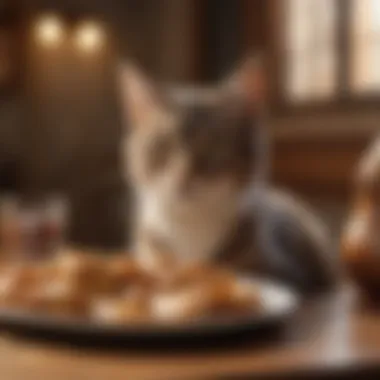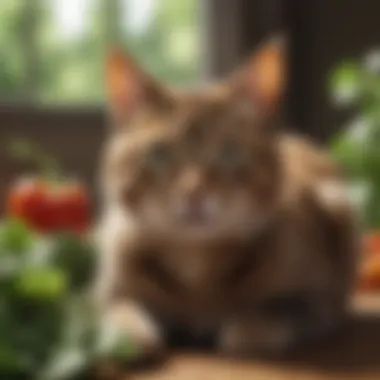Discover What Foods Can Safely Complement Your Cat's Diet


Pet Care Essentials
When it comes to caring for our feline friends, understanding their unique nutritional needs is crucial. Cats are obligate carnivores, meaning their diet must consist primarily of meat to thrive. However, there are safe human foods that cats can enjoy besides traditional cat food. Pet owners should be aware of the risks associated with feeding cats inappropriate foods, as it can lead to nutritional deficiencies and health issues. Ensuring a balanced feline diet requires careful consideration and informed decisions.
Safe Human Foods for Cats
While cats should primarily consume cat food to meet their dietary requirements, there are certain human foods that can be fed to cats in moderation. These include cooked lean meats such as chicken, turkey, and beef, as well as vegetables like carrots and green beans. It's important to avoid foods that are toxic to cats, such as onions, garlic, chocolate, and grapes. By incorporating safe human foods into their diet, pet owners can offer their cats variety while ensuring nutritional adequacy. Remember, moderation and balance are key when introducing human foods to a cat's diet.
Dietary Risks to Consider
Pet owners must be aware of the potential risks associated with feeding cats foods outside of their typical diet. Certain human foods can be harmful to cats, causing digestive issues, toxicity, or allergies. Common allergens for cats include dairy products and grains. Additionally, high-fat foods can lead to obesity and gastrointestinal problems. By understanding these risks and being cautious in their choices, pet owners can help maintain their cats' health and well-being.
Balancing Your Cat's Diet
Achieving a balanced diet for your cat involves a combination of cat food, safe human foods, and occasional treats. It is essential to consult with a veterinarian or feline nutritionist to develop a customized meal plan that meets your cat's specific nutritional needs. Factors such as age, weight, activity level, and any existing health conditions should be taken into account when crafting a balanced diet. By prioritizing your cat's dietary requirements and making informed choices, you can contribute to their overall health and longevity.
Introduction
Understanding Feline Dietary Needs
Delving into the intricacies of feline dietary requirements unveils the fascinating world of obligate carnivores, where cats reign supreme as meticulous meat-eaters. The Obligate Carnivore Nature of Cats stands as a cornerstone in understanding cats' distinctive dietary needs. This key aspect underscores the crucial reliance of cats on animal-based proteins for their sustenance, highlighting the metabolic intricacies and nutritional dependencies that shape feline food preferences. Exploring this feline attribute reveals why protein-rich diets align harmoniously with cats' biological predispositions, marking it as a significant focal point in the narrative surrounding cat nutrition.


Safe Human Foods for Cats
In this section, we delve into the importance of including safe human foods in your feline companion's diet. Understanding the significance of providing alternative food options besides cat food can offer variety and essential nutrients to enhance your cat's overall well-being. By exploring safe human foods for cats, pet owners can broaden their knowledge of suitable dietary choices that align with their feline friend's nutritional requirements. Considering specific elements like protein sources, vegetables, fruits, grains, and carbohydrates can contribute to a balanced diet, promoting optimal health for your cat.
Protein Sources
Chicken
Delving into the realm of protein sources for cats, chicken emerges as a notable option due to its high-quality protein content. Chickens are widely known for their lean meat, making it a valuable choice to support feline muscle growth and maintenance. The key characteristic of chicken lies in its digestibility for cats, allowing for easier breakdown and absorption of essential nutrients. This popular protein source offers cats a palatable and nutrient-dense meal option, contributing to a well-rounded feline diet. While chicken provides various benefits, it is essential to consider potential drawbacks such as allergenic reactions in some cats.
Turkey
Turkey stands out as another valuable protein source for feline dietary needs. This lean meat option offers cats a protein-rich diet that supports their muscle development and overall health. The key characteristic of turkey lies in its low fat content, making it a favorable choice for cats prone to weight issues. Including turkey in your cat's diet can provide essential nutrients while offering a flavorful alternative to traditional cat food. However, it is crucial to monitor your cat's response to turkey, as some felines may have sensitivities to this protein source.
Fish
Exploring protein sources further, fish emerges as a distinct option enriched with essential nutrients for feline nutrition. Fish, such as salmon or tuna, provides cats with omega-3 fatty acids that promote healthy skin and coat. The key characteristic of fish lies in its palatability, appealing to cats with discerning tastes. Including fish in your cat's diet can introduce a new flavor profile and essential fatty acids vital for overall feline health. Despite its benefits, it is important to note that some cats may be sensitive to fish or prone to fish-related allergies.
Potential Dietary Risks
When it comes to ensuring the well-being of our feline companions, understanding potential dietary risks is paramount. In this article, we delve into the importance of being knowledgeable about what foods can be harmful to cats. By highlighting these risks, pet owners can make informed choices to safeguard their pets' health. Addressing potential dietary risks empowers cat owners to prioritize their pet's nutrition and overall wellness.


Toxic Foods for Cats
- Onions and Garlic: Onions and garlic, while flavorful for humans, pose significant dangers to cats. These ingredients contain compounds that can damage a cat's red blood cells, leading to severe health complications. In this article, we emphasize the toxic nature of onions and garlic for felines, shedding light on why these common ingredients should be avoided in a cat's diet.
- Chocolate: Chocolate, a beloved treat for many, contains theobromine, a substance toxic to cats. Consumption of chocolate can trigger symptoms like vomiting, diarrhea, and even heart issues in cats. Understanding the risks associated with chocolate consumption is crucial for responsible pet ownership. We elucidate the detrimental effects of chocolate on feline health, underlining the importance of keeping this sweet treat away from cats.
- Grapes and Raisins: Grapes and raisins, although healthy for humans, are harmful to cats and can cause kidney failure. Despite their innocuous reputation, these fruits are toxic to felines and should be strictly avoided in their diet. By exploring the risks posed by grapes and raisins, cat owners can better appreciate the significance of mindful food choices for their pets' well-being.
Allergies and Sensitivities
Addressing food allergies and sensitivities is vital in ensuring a cat's dietary health. By recognizing the signs of food-related issues in cats, pet owners can proactively manage their pet's diet and prevent potential health complications. Identifying food allergies enables pet owners to tailor their cat's food regimen to suit their specific needs, promoting a healthier and happier life for their furry companions.
- Identifying Food Allergies: Identifying specific food allergens in cats is crucial for eliminating triggers that could harm their health. By pinpointing allergens, cat owners can adjust their pet's diet accordingly to prevent adverse reactions. This section delves into the significance of identifying food allergies in cats, offering insights into creating a safe and customized diet plan for feline friends.
- Common Signs of Food Sensitivities: Recognizing common signs of food sensitivities empowers cat owners to address potential dietary issues promptly. Symptoms like skin problems, digestive disturbances, and respiratory issues indicate underlying sensitivities that require attention. Shedding light on these signs equips pet owners with the knowledge needed to provide optimal care for their cats, fostering a harmonious and healthy bond between pet and owner.
Balanced Diet Considerations
A balanced diet is crucial in maintaining the optimal health and well-being of our feline companions. When it comes to cat nutrition, balanced diet considerations play a pivotal role in ensuring that cats receive the necessary nutrients for their growth, energy, and overall health. This section delves into the significance of balanced diet considerations within the context of this article, shedding light on the specific elements, benefits, and considerations that every cat owner should be mindful of when planning their pet's diet.
Nutritional Requirements
Protein
Protein stands as a cornerstone in feline nutrition, serving as a vital component for various bodily functions such as muscle development, tissue repair, and enzyme production. Cats being obligate carnivores require a protein-rich diet to match their biological needs adequately. The key characteristic of protein lies in its amino acid profile, which is essential for maintaining feline muscle mass and strength. Opting for protein-rich sources such as chicken, turkey, and fish can ensure a well-rounded diet for cats. However, excessive protein intake may burden the kidneys, making portion control pivotal. While protein nourishes cats effectively, oversupply can lead to potential health concerns.
Fats


Fats contribute significantly to a cat's diet by providing essential fatty acids, like omega-3 and omega-6, promoting healthy skin, coat, and aiding in nutrient absorption. The distinctive attribute of fats lies in their caloric density, which offers a concentrated energy source for cats. Including fats like fish oil or chicken fat can enhance the palatability of cat food and support skin health. Nonetheless, excessive fat consumption can lead to obesity or digestive issues, warranting a balanced approach. Fats play a crucial role in feline diets, yet moderation is key to avoid adverse impacts.
Vitamins and Minerals
Vitamins and minerals are pivotal in supporting various physiological functions in cats, ranging from immune system strength to cell maintenance. The key characteristic of these micronutrients is their ability to act as cofactors in enzymatic reactions, ensuring proper bodily processes. Incorporating vitamin-rich foods like liver or leafy greens can bolster cat health comprehensively. However, improper supplementation or overconsumption of certain vitamins can pose health risks. While vitamins and minerals are essential for feline well-being, a balanced and varied diet is essential to prevent nutritional imbalances.
Feeding Guidelines
Portion Control
Portion control plays a vital role in managing a cat's weight and preventing obesity-related complications. By moderating the amount of food provided to cats, owners can ensure that their pets receive adequate nutrition without overindulgence. The key characteristic of portion control is its ability to regulate caloric intake, promoting a healthy weight for cats. Implementing portion control strategies, such as measuring meals and limiting treats, can aid in maintaining feline fitness. However, overly strict portion control may lead to nutrient deficiencies, necessitating a balanced approach. Portion control contributes significantly to feline health, but a balanced and measured approach is essential.
Water Intake
Water intake is critical for cats to support various bodily functions such as digestion, nutrient transport, and temperature regulation. The key characteristic of adequate water intake lies in its role in maintaining hydration, preventing urinary issues, and supporting kidney function. Encouraging cats to consume sufficient water through wet food, fountains, or multiple water bowls is vital for their overall well-being. However, dehydration can lead to serious health complications, emphasizing the importance of consistent access to clean water. While water intake is crucial for feline health, vigilance is necessary to ensure cats remain well-hydrated.
Consulting with a Veterinarian
Consulting with a veterinarian is paramount in establishing a tailored and effective dietary plan for cats. Veterinarians possess the expertise to evaluate a cat's individual needs, address health concerns, and recommend suitable dietary adjustments. The key characteristic of consulting with a veterinarian is the personalized guidance and professional advice provided, ensuring optimal feline health. Seeking veterinary consultation for issues like dietary allergies or weight management can lead to informed decisions and improved well-being for cats. Nonetheless, overlooking veterinary guidance can result in suboptimal dietary choices, underscoring the importance of professional input. Consulting with a veterinarian is indispensable for cat owners looking to enhance their pet's health through informed dietary decisions.
Conclusion
In the realm of feline nutrition, understanding what your cat can eat besides cat food is paramount for their health and well-being. As responsible pet owners, we hold the key to providing our beloved feline friends with a diverse and nourishing diet. This knowledge equips us to make informed choices that can significantly impact the overall health of our cats. By exploring safe human foods, potential risks, and balanced diet considerations, we enhance our ability to cater to our cats' nutritional needs more effectively.
Ensuring Feline Health Through Informed Choices
When it comes to ensuring feline health through informed choices, embracing variety in a cat's diet emerges as a crucial factor. By introducing a range of safe and nutritious human foods, pet owners can offer their cats a palette of flavors and nutrients that contribute to a well-rounded diet. Embracing Variety in Cat Diet allows cats to experience different textures, tastes, and nutritional profiles, which can prevent dietary boredom and deficiencies. This approach promotes holistic health and satisfaction in feline companions.
Prioritizing Feline Nutrition is another indispensable aspect of feline wellness. By focusing on providing high-quality, nutrient-dense foods specifically tailored to meet cats' dietary requirements, pet owners can ensure optimal feline health. Prioritizing Feline Nutrition involves selecting foods rich in essential proteins, fats, vitamins, and minerals crucial for a cat's overall well-being. This emphasis on nutrition contributes to a cat's longevity, vitality, and immune system strength, reinforcing the significance of thoughtful dietary choices for our beloved companions.







